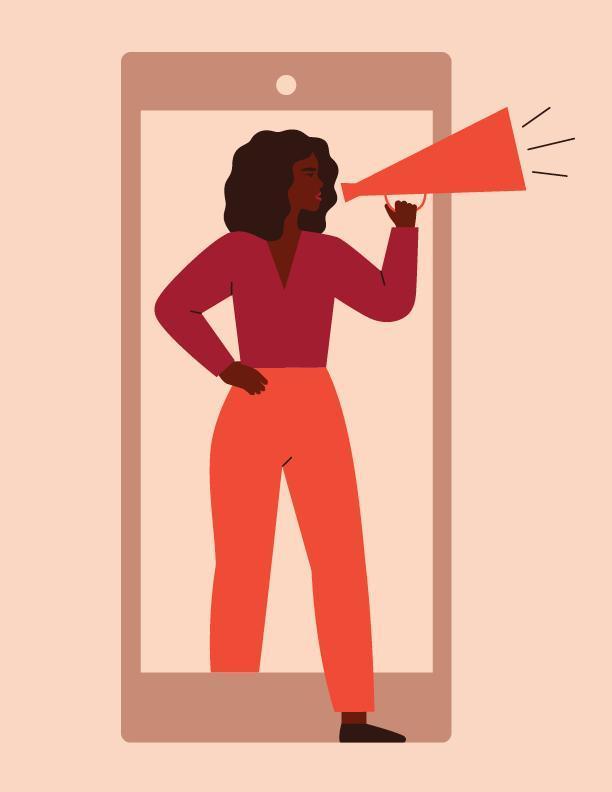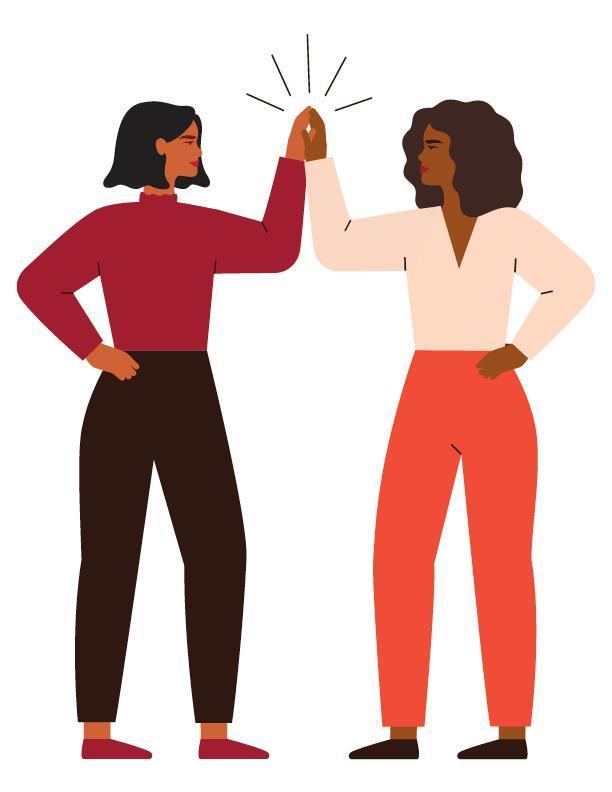Woman of Color Coalition Builds Inclusive Community
Bringing Support, Networking, and Skill-Building
By Abbott Brant
When Samiksha Manjani reached out to her classmate Rolonda Donelson to have coffee over Zoom last fall semester, the two American University Washington College of Law 1Ls became fast friends.

“I told her how thankful I was to connect with another woman of color in our section,” Manjani said. “We shared our joys, sorrows, wins, and losses together. We shared resources, tips, and connections constantly. We got through it together and came out on top.”
From this budding friendship blossomed an idea—to create a space for these types of connections and conversations to happen across the AUWCL community among other women and femmes of color.
“We often talked about our experiences of marginalization. We realized that a huge reason each of us were able to get through the semester was because of our friendship,” the pair explained. “We also talked about the fact that other women and femmes of color on campus might not have that. We wanted to change that and create a network.”
After bringing the idea to Assistant Dean for Diversity, Inclusion and Affinity Relations Lisa Taylor, and with the help of Assistant Director of Student Affairs Lucinda Gardner and SBA Director of Diversity Initiatives Isabel Garcia, AUWCL’s Women of Color Coalition (WOCC) was born. The upcoming student organization seeks to create “a brave space for women and femmes of color at AUWCL for support, networking, and skill-building.” In addition to student members, the organization is also open to AUWCL staff, faculty, and alumni.
WOCC seeks to prioritize an intersectional lens, recognizing that women and femmes—a term that refers to a queer person whose gender expression is considered to be feminine—of color come from different backgrounds, identities, and experiences. Through various efforts and programming, the organization aims to uplift and empower members of this community.
Founders Who Champion Public Interest
Deeply passionate about public interest work and inclusivity, Donelson and Manjani chose AUWCL for its standout efforts and accomplishments in both these areas.

“I was really interested in attending a law school that was focused on improving diversity and inclusion,” Donelson, a District of Columbia native, said. “I also wanted to attend a school that values service to the community. The In My Back Yard Day of Public Service and the Clinical Program that assists low-income individuals in the D.C. area demonstrated to me that AUWCL was a school that cared about the community it was situated in.”
Manjani, who hails from Gaithersburg, Maryland agreed, noting AUWCL’s Public Interest Program and leading Clinics ranked #3 in the nation by U.S. News. But what ultimately drove her decision was AUWCL’s commitment to diversity.
“The [AUWCL] student body is extremely diverse compared to other law schools in D.C. and around the nation. I wanted to be at a law school that valued different backgrounds, identities, and experiences,” she said. Upon graduation, Manjani hopes to work for a nonprofit in the District of Columbia focused on gender-based violence work, using her legal degree to increase legal and supportive services, particularly with people of color and the LGBTQ+ communities.
For Donelson, her aim is to help remedy problems and improve lives in the local DMV community, which she has called home her entire life. “I am particularly interested in family law related to gender-based violence and protection of children,” said Donelson, who cited immigration law as another area of interest.
Expanding the Conversation on Diversity and Inclusion
For Manjani, the startling statistics on representation in law underscore the importance of WOCC’s work—as it stands today, the field is 86% white and 63% male. “Of the few women of color attorneys in the field, 75% of women of color associates at private firms leave within five years of being hired,” she said. “The ABA reports that women of color persistently face marginalization, stereotyping, and lack of support in the legal field.”

Manjani said it’s important to recognize for many, these type of experiences begin in law school. While AUWCL leads the way nationally in championing inclusive excellence—the law school is consistently recognized by preLaw Magazine with 'A' grades in diversity and boasts a fall 2020 entering class with more than 40% diversity representation—there are still important conversations to be had about inclusion and equity among all our students from every background.
“I have at times experienced marginalization and microaggressions, and I don’t doubt that the isolation I have felt was magnified by doing law school over Zoom,” Manjani said. “However, I started to notice quickly that other women of color in my section, or the faculty and staff I spoke to, had similar experiences. The common thread tying us all together was the need for support, resources, professional networking, and skill-building.”
Citing the work of diversity scholars like Kimberlé Crenshaw, Taylor said there is “a framework to understand and address the way women and femmes of color experience bias and discrimination. Even in such a richly diverse community like WCL, the intersection of multiple identities can further a sense of marginalization as women of color are ostracized, face hostility, or are disregarded, not just because they are women or as people of color, but because they are women of color.”
Taylor said that the remote learning environment can exacerbate feelings of isolation and increase the chances for expressions of bias and microaggressions.
“Affinity student organizations at WCL have done a remarkable job this year at providing supportive spaces for their members, and the WOCC is also doing this in a decidedly intersectional way. Through its commitment to anti-racism, WCL has created a multipronged approach to creating an environment where all members of the WCL community can be their authentic selves,” she said. “These include guidance to faculty and staff on equity in online learning environments, implicit bias training to address microaggressions and other forms of bias, and policy proposals on how the institution can address and reduce bias incidents at the law school.”
Experiences, Community, Future
Active since only January, the WOCC already has quite the following, garnering several hundred Instagram followers within its first months. The first event in its virtual “Women of Color in Law Round Table Series,” which was themed “experiences,” saw 25 attendees. The two additional panels in the series discussed the topics of “community” and “future.”
“We wanted to create an upward and hopeful trajectory with our [first series] theme,” Manjani and Donelson explained. “The first event focused on some of our more painful experiences of marginalization and discrimination. We didn’t want to overlook the reality that women and femmes of color in law face. It gave us an opportunity to reflect on our personal experiences and learn more about mental health resources to keep us strong in our endeavors.”
The second round table focused on the strength women and femmes of color have in community. “There is so much joy in being a woman or femme of color, and we wanted to celebrate that experience,” the pair said. The final session underscored how, though often overlooked, women and femmes of color are big players in social movements and societal change throughout U.S. history. The conversation sought to empower attendees with a focus on confidence building and vision setting.
As the WOCC continues the process of being recognized as an official student organization, Manjani and Donelson are developing ideas for additional events throughout the year ahead, including an alumni panel, a mentorship program, connecting students with internships and research positions, a salary negotiation workshop, and an allyship workshop, as well as hosting social events to cultivate a strong professional and personal community. They also hope to work closely with the administration to improve campus resources and financial aid for women and femmes of color at AUWCL.
“When Samiksha reached out to me, I realized I was not the only person feeling isolation and imposter syndrome, and that the conversation we had would be something we could bring other women of color into,” Donelson said. “I believe it’s important to have organizations like WOCC at AUWCL because we want to become a space to empower women and femmes of color. We want to create a support network for current students and alumni in order to combat the imposter syndrome, microaggressions, and other obstacles that they might face in law school and in practice.”
